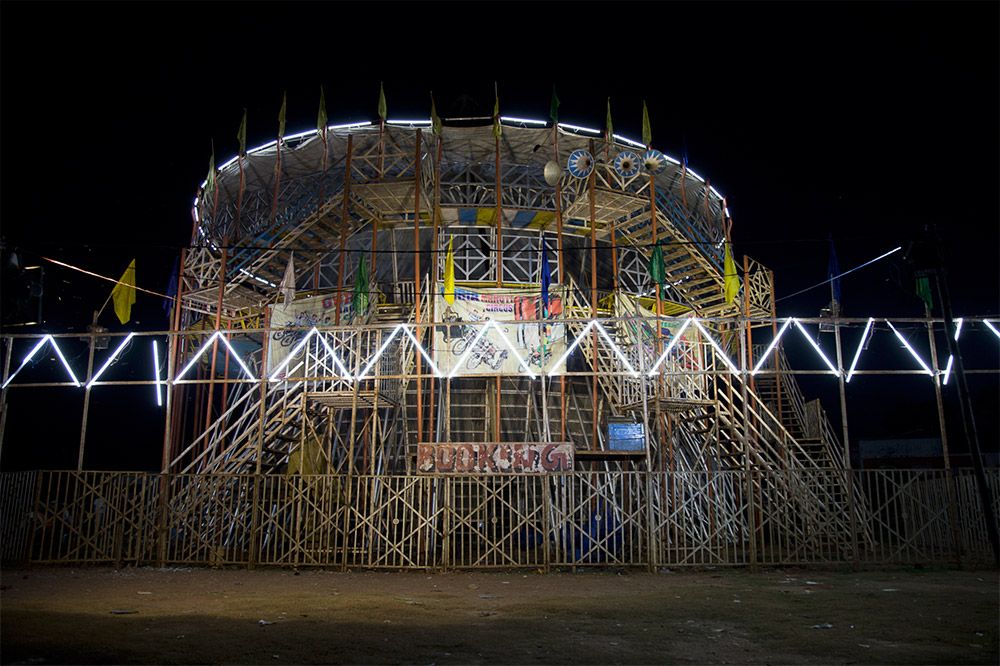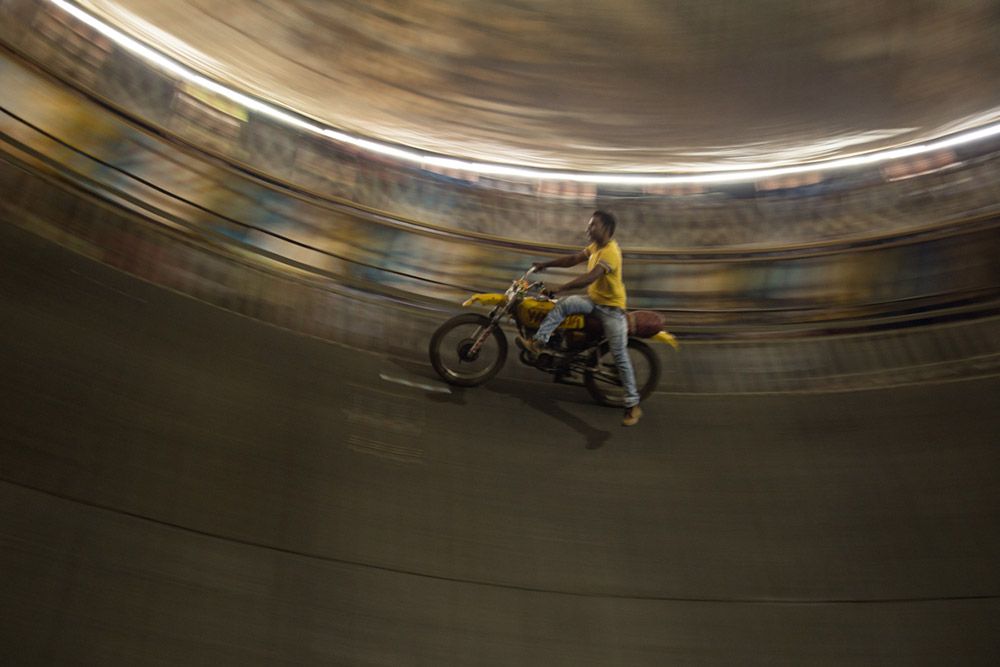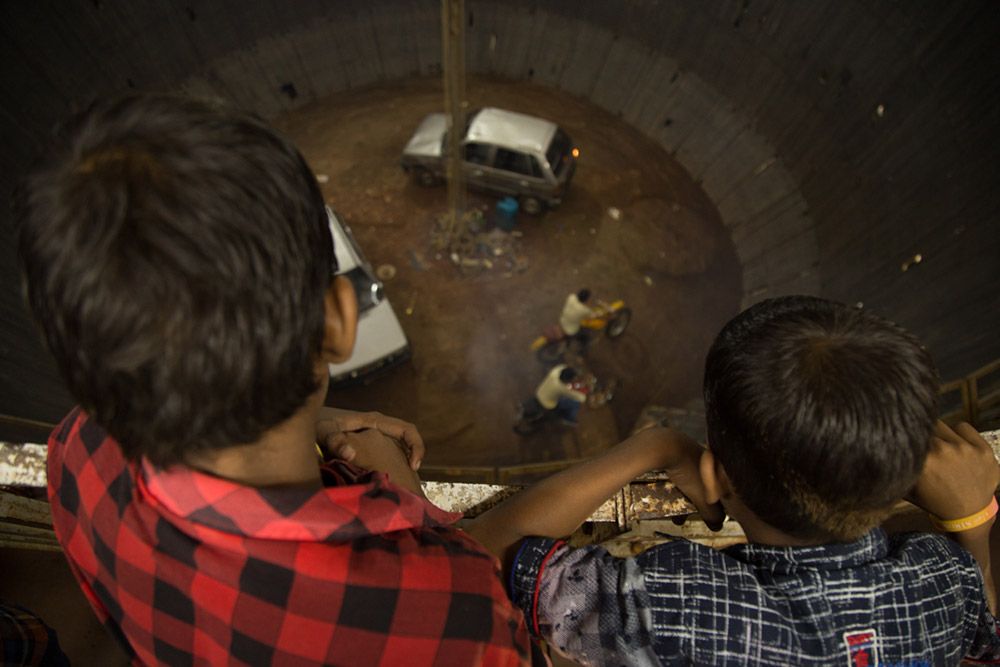blog
Interview with photographer Abhirup Dasgupta

The Well of Death lights up the dark evening surroundings of Kandra, a small town in Jharkhand, for a show where the bikers defy gravity.
F-Stop Magazine: How did you first become involved in photography and what led to you working in this medium as an artist?
Abhirup Dasgupta: I have always been fascinated by the idea of the still image. As a child I remember my first exposure to photography was through family albums. There were a large number of them in our house. My maternal grandmother and uncle both used to click a lot of pictures of family get-togethers and other fun moments, many of which happened before I was born and I used to love visiting them. I think my favourite album out of all them was the one with pictures of my uncle when he moved to Chicago for work back in the 90s. Tv came much later into my life so my first exposure to a different country was through the photographs of my uncle in USA. I still remember observing the details of those pictures very minutely. I remember how the streets and cars and the buildings looked quite different from what I saw in India. I guess I still look for details when I enter a new space and try to include them in my frames, somewhat like a mis-en-scene in cinema, especially while clicking portraits. I love environmental portraits much more than close-ups where the details of the space around the person adds to their character.
F-Stop: The Portfolio 2019 issue of F-Stop Magazine features your project “Tryst with Death,” can you tell us about this project? What led to this work?
AD: Tryst with Death is a photo essay based on the popular motor sport known in India as, Maut ka Kuan (Well of Death). When I was growing up it used to be a common sight to have a Well of Death in all the fairs happening in my town, Jamshedpur. However, due to the high risks involved to both the riders and the spectators, it was banned in the capital, Delhi following which a lot of restrictions had been put on its display in major cities. Nowadays it is mostly found in the rural areas. Through this photo essay I wanted to portray the sport and more importantly the people who are still involved in it out of a passion for biking inspite of the meagre financial returns from it.
The project started quite accidentally. I was headed to Kandra on the outskirts of Jamshedpur for a shoot when I came across the Guria Maruti Circus well of death and was instantly drawn towards it because I had seen it after a long time. It was a nostalgic pull.

Md Shamil Ansari, manager and rider at the Guria Maruti Circus, performing a stunt by getting off his motorcycle while at full speed on the vertical wooden walls of the Well of Death in Kandra, a small town near Jamshedpur, Jahrkhand.
F-Stop: Can you discuss your process for making these images, or your creative process more generally?
AD: Usually I do some preliminary research on the subject I am about to shoot. However, in this case since I chanced upon the subject I directly approached the motorcycle riders who stayed right behind the silodrome and spoke with them listening to their experiences. I also looked at the space and knew what kind of shots I could expect from the shoot. That helped me a lot to have a basic framework ready in my mind before going in to shoot the next day. That said everything cannot be pre-decided and a lot is left to the moments which unravel and the happy accidents.
F-Stop: How do you choose what or who to photograph, what are you looking to capture?
AD: While working on a story my primary intention is to stay as true as possible to the situation and provide an honest depiction of what I see and feel as a person in that very moment. While shooting I try to capture everything that is happening around from the most exciting to the most banal moments as they all help me in creating the entire experience of being in that space. It also helps to have a wide spectrum of moments for editing and sequencing them later.

Kids peek over the railings of the gallery to get a closer look at the riders as they get ready to climb the walls on their wheels.
F-Stop: You studied sociology in college, how does that influence or tie into the pictures and projects that you make or the subjects or themes you choose to photograph?
AD: I am drawn to people belonging to the marginalised sections of society, people on the fringes. I do feel that studying sociology has had an impact on me in the way I look at the idea of gender, caste, class and society as a whole. I still remember how one of our professors in college stressed on the idea of de-bunking our pre-conceived notions with regards to society and looking at it through the prism of scientific research, fieldwork and other important tools which sociologists use to arrive at a conclusion. I feel it has helped me immensely in developing as a person and respecting my fellow humans.
F-Stop: Are you working on any other projects currently?
I am currently working on a project on the evolution and current condition of Ol Chiki, a script developed by the Santhal tribe in India which is almost on the verge of extinction due to it being overshadowed by the more dominant languages in our region such as Hindi, English, Bengali and Odia.
To see more of Abhirup Dasgupta’s work visit the current Portfolio 2019 issue or https://abhirupdasgupta101.myportfolio.com/
Location: Online Type: Documentary, Featured Photographer, Interview
Events by Location
Post Categories
Tags
- Abstract
- Alternative process
- Architecture
- Artist Talk
- artistic residency
- Biennial
- Black and White
- Book Fair
- Car culture
- Charity
- Childhood
- Children
- Cities
- Collaboration
- Community
- Cyanotype
- Documentary
- Environment
- Event
- Exhibition
- Faith
- Family
- Fashion
- Festival
- Film Review
- Food
- Friendship
- FStop20th
- Gender
- Gun Culture
- Habitat
- Hom
- home
- journal
- Landscapes
- Lecture
- Love
- Masculinity
- Mental Health
- Migration
- Museums
- Music
- Nature
- Night
- nuclear
- p
- photographic residency
- Photomontage
- Plants
- Podcast
- Portraits
- Prairies
- Religion
- River
- Still Life
- Street Photography
- Tourism
- UFO
- Water
- Zine

Leave a Reply